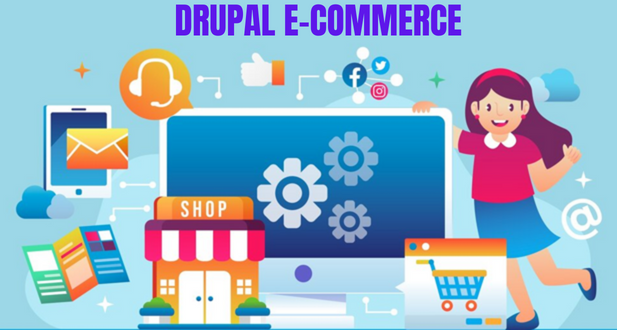What is Drupal commerce?
Open-source eCommerce software called Drupal Commerce enhances the Drupal content management system. Drupal Ecommerce handles a variety of tasks for online retailers, including displaying items for purchase, guiding consumers through the checkout process, keeping track of invoices, receipts, orders, & payments, facilitating shipping and price, and more.
About E-commerce
The trade of products and services through the internet is known as e-commerce. On the information superhighway, your bustling city center or physical store is being transformed into zeros and ones. 2.14 billion individuals are anticipated to make online purchases globally this year, and more than 150 million Prime members use Amazon stores to make purchases.
E-commerce is one of the numerous ways that consumers buy and sell goods in the retail industry. Some businesses simply sell things online, but for many, e-commerce serves as a conduit of distribution as part of a larger business plan that also includes physical storefronts and other revenue sources. In either case, e-commerce enables startups, established enterprises, and multinational corporations to sell their goods globally.
What is an e-commerce website?
An e-commerce website serves as your online storefront.It facilitates the transaction between a vendor and a buyer. Your products are shown there when your online customers choose them in a virtual setting. Your website is a representation of the product racks, salesmen, and cashiers in your online commerce channel.
Businesses may develop their own e-commerce website on a dedicated domain, create a branded shop experience on a website like Amazon, or even do everything as part of a multi-channel strategy.
What business benefits might Drupal offer
Popular open-source content management systems (CMS) like Drupal are great for large, busy websites like e-commerce sites. Drupal is used in the development of 10.65% of the top 10,000 high-traffic websites, according to the BuiltWith service. Drupal was utilized to power the websites of several Fortune 500 corporations, including Tesla and General Electric. Furthermore, many private businesses and major universities like Harvard University use Drupal CMS on their websites.
- Scalability makes it possible to control changing demand.
You must scale the website as the user base expands in order to handle the increased traffic without degrading its performance. To meet seasonal demand increases, e-commerce scalability is essential; otherwise, firms run the risk of losing clients and revenue. Customers were redirected to the home page in 2018 because Amazon was unable to handle a spike in website traffic during its Prime Day offer. It was estimated that this hour-long downtime caused Amazon $1 million in damages.
The scalability provided by Drupal helps you to handle peak demands efficiently and assures dependable performance. It continues to be the CMS of choice for busy websites.
- Security
Top companies and private groups are embracing Drupal since it is one of the most secure CMSs. Customers’ data & credit card details are stored by e-commerce companies, which raises the danger of cyberattacks. A committed team at Drupal consistently works to increase platform security, and they frequently provide patches, bug fixes, & security upgrades. Additionally, you may create a secure website with the aid of several modules and features like password protection, two-factor authentication, and many others.
- Integrations for efficiency and automation of processes
Businesses employ a variety of external technologies for marketing and process automation. For handling customer data and interactions, they employ customer relationship management (CRM).
With the use of integration modules & APIs, Drupal provides seamless integration possibilities with CRM and several third-party apps.
- Flexibility to expand website features and functionality
More than 48,000 modules & 3,000 themes are available in Drupal to expand the features and functionality of your website. You can create user-friendly, customer-focused websites thanks to it.
- Efficient and economical use of technology
Drupal doesn’t have any restrictions that prevent you from developing modifications and extensions or charge exorbitant commercial licensing costs. Additionally, you benefit from the combined wisdom and expertise of the world’s developer community. Your technological costs will be reduced by Drupal, which will increase your return on investment (ROI).
Drupal’s e-commerce site types
Two methods may be used to build an e-Commerce website that makes use of Drupal’s strengths.
- Headless business
The term “headless commerce” describes the division of an eCommerce application’s front end and back end in order to provide a unique and tailored customer experience. The number of frontends and user interfaces a company must manage to deliver seamless online consumer experiences has increased due to the growth of digital touchpoints.
You may concentrate on frontend experiences since the backend’s business logic, features, and capacities are separated. You may modify the frontend experience with confidence that it won’t have an effect on the infrastructure or underlying architecture.
The basic e-Commerce capability serves as the backend infrastructure for headless commerce. Through the e-Commerce platform’s API, you may link different frontends or the user interface. You may control several online sales channels thanks to it, including websites, mobile applications, third-party marketplaces, etc.
- Drupal Commerce
The Drupal Commerce module is one of the many community-contributed & maintained modules that contribute to Drupal’s inherent scalability and flexibility. You may create e-Commerce websites or online stores with the module, which makes use of Drupal’s preexisting architecture and provides a full e-Commerce package. The package includes several modules for ordering, carts, payment gateways, shipping, fulfillment, marketing, and analytics. You can create new functionality by utilizing provided modules.
The benefits of Drupal are also present in Drupal Commerce, such as the API-first strategy that enables numerous integrations. They may still connect Drupal & Drupal Commerce with whatever legacy systems they have already put in place. Because of the constant data and information interchange across several platforms, Drupal security is essential for commerce deployment.
About Using Drupal
- Open source gives you total control
Because Drupal is open-source software, anybody can use it and modify its code for any purpose. It is truly yours to do as you like; there have been no licensing fees or other charges.
Additionally, Drupal’s core functionality has already been expanded with over 40,000 modules that provide new capabilities. Since most, if not all, of the functionality, is already present, specialized software development isn’t actually necessary for conventional websites. Accessing and extending the code through internal or external developer resources, however, is a huge advantage for large, sophisticated websites.
It guarantees that the platform for your website may be integrated with any other software you employ. Scalability and business automation depend on this.
- A world of assistance at your disposal
Software developers are drawn to Drupal because of its inherent qualities. Since the platform is open source, there are no restrictions on how to utilize it, making it simple and affordable to give it a shot.
This has a tendency to attract people (both students and specialists alike), as well as all kinds of organizations, which has consistently cultivated a warm and active community. In fact, “Come for the Software, Stay for the Community” has become a catchphrase used to describe the Drupal community.
Later, I’ll expand on this, but this sizable community also makes Drupal one of the more secure website platforms available. With so many people actively reviewing the code, security flaws are swiftly identified, reported, and fixed. Typically, all a company needs to do is maintain its software current.
- Contemporary apps require modern frameworks
Although there is a sizable community contributing to the development of Drupal, the platform does have a strong framework in place for directing progress toward several strategic goals. These activities are what propel the platform’s ongoing evolution.
The API-First project is perhaps the largest and most significant of these strategic initiatives. According to the initiative page:
The Drupal APIs are available for usage, and significant progress was already done on this project.
The Admin UI & JavaScript Modernization program is another noteworthy project. It’s likely that if you ask someone what they dislike most about Drupal, they will respond something along the lines of “it’s difficult to use.” Funny thing is, it’s actually not that unpleasant if you get used to it.
- Scales up with your company
Scalability is a crucial idea that any internet business should be conscious of. The ideal scenario is for handling business expansion to need as little time and money as possible. Being able to successfully manage the increase is scalability.
In a typical brick-and-mortar store, you would need to recruit additional employees as more people came in to shop. People working on the floor, just at registers, and support employees like your accountants are all included in this.
Staffing expenditures soar when the firm expands in order to meet the extra workload. This is due to the fact that the majority of manual physical business activities demand a physical presence.
This is unacceptable in the realm of the internet. Almost all aspects of internet business are carried out using software. Through automation and integrations, scalability is the concept of allowing the software to “speak” to each other and automatically convey information. There is essentially relatively little need for human interaction in a perfect environment.
As more customers buy, the automation that handles any client data will automatically scale. Because the software already can manage this data, a firm designed for scalability doesn’t need to hire extra employees to do so. Because expense is substantially lower, earnings can be significantly higher than for “ brick and mortar ” businesses.
Reverting to Drupal, its API-first strategy and adaptable open-source basis make it a perfect platform for scaling. Drupal could be the ideal choice for expanding or established firms that can now spend back into the growth of their eCommerce infrastructure, as it may be too expensive for small enterprises to construct the integrations they require.
- At its best, security and stability
Software like Drupal is regarded as being extremely secure. Governments, academic facilities, media outlets, major merchants, and others trust it. A list of examples is available here. During his presidency, the Obama administration even employed Drupal for the White House website.
The large quantity of developers inside the Drupal community, as I previously stated, helps keep an eye just on the underlying code. Because Drupal adheres to a rigid code standard, this is possible. This standard provides developers with a reference while also guaranteeing that the new code is compatible with the rest of Drupal. Because it is simpler to read, any problems are simpler to find.
There are other safeguards in place besides coding requirements. Additionally, Drupal has a committed Drupal Security Team that continuously monitors the main program to make sure it complies with OWASP requirements. Additionally, the security team aids in developing community-contributed modules in maintaining their security.
Security warnings are disseminated when a problem is discovered using a variety of means, including the Drupal website, email, social media, as well as the CMS itself. Hard to miss them. The advisories provide all pertinent information, such as the release date for a patch to remedy it. Knowing that Drupal is a self-hosted CMS and keeping up with security upgrades is crucial.
- Establishing expansive digital experiences across several mediums.
In the first two phrases on the homepage of drupal.org, you may find a summary of Drupal. We are the top open-source CMS for creating ambitious online experiences that engage users across channels.
In a world of generic solutions, Drupal enables you to build a distinctive area because every one of us has individual demands. Drupal is frequently described as being flexible, and you can see that its marketing plays up this association. A CMS first and foremost, Drupal excels at this.
Drupal can easily create anything, from a straightforward blog to a fully-fledged media outlet. It works best in complicated, unusual situations, which is why the marketing refers specifically to “cookie-cutter” fixes. While Drupal may produce generic content, its true strength lies in complicated and unique projects.
There are many configurations and applications for each material that is developed. Without having to completely rebuild it, this content may be modified and utilized again. It may be distributed using RSS feeds and newsletters. Drupal may operate headlessly as a backbone content repository with the front end of your choice thanks to the API-first movement.
This makes it possible for the same backend to deliver content to several channels, including kiosks, mobile apps, and websites.
- Suitable for experience-driven online shopping.
The topic of e-commerce is the last. It’s possible to use Drupal as both an e-commerce and content management system. Being forced to choose between the two is common, so this is a very significant issue. But not here; there are other ways to expand Drupal’s capability to support eCommerce, thanks to the contributor module library (more on this below). Moreover, there are several excellent, comprehensive, and complicated eCommerce solutions accessible.
Drupal becomes the ideal platform for delivering knowledge of eCommerce, regardless of what that experience is when content and commerce are combined. Does the audience need to be moved by the tale your brand is telling them? Does it have to make you feel a specific way? If so, Drupal is the best option.
Reasons to use Drupal for your eCommerce website
- Unimaginable Functionalities:
Drupal Commerce has powerful and complex features like poll management, graphics, etc. that help web designers create cutting-edge websites. Using forums, pictures, event calendars, and videos on your website is another benefit of Drupal.
Additionally, if you’re building a website for a corporate customer, its multi-user feature will come in very handy.
- Advanced Modules:
Drupal Commerce comes with fundamental functionality in the form of core modules because it is a modular, open-source online content management platform. However, one module is Secure Pages, a pretty straightforward module that enables you to guarantee straightforward methods on your website by making use of some elementary example matching.
In Drupal, there are 2 themes and 29,000 modules that may be extensively utilized to create customizable templates. These modules improve the functionality of the website without forcing the developers to conduct many manual tasks.
- Rapid deployment:
You may launch websites powered by Drupal Commerce in a matter of hours. The platform for handling the content, pictures, and third-party integration is not a concern for the developer once the core is implemented.
You may take advantage of the ability to make adjustments after the site is deployed by using the right Drupal development services. A live site may be modified based on customer and company input.
- Smart Device Compatibility:
It is now nearly difficult for any marketers, organizations, corporates, or advertising to function without a mobile-compatible website due to the rising popularity of mobile internet as well as the fierce rivalry in the commercial sector. It should be noted that these websites make considerable use of Drupal eCommerce.
Every kind of business benefits from internet marketing. Drupal Commerce builds websites with this consideration in mind, making sure that they can be accessed on iPads, Android phones, as well as other smart devices in the same manner that they are viewed just on websites.
- SEO-Friendly:
Drupal’s SEO modules primarily include Page Title, Pathauto, Sitemap, and XML Sitemap, which offer a variety of choices for making information visible in a way that is search-engine friendly. Due to the fact that all of the main search engines, including Google, Yahoo, and Bing, are content-driven and prioritize highly valuable and valuable material to rank their websites higher, the significance of Drupal development services resides in this.
Drupal is regarded as the greatest platform for building e-commerce websites! With the top-notch features and versatility that Drupal development solutions provide, it is possible to build an amazing website that is safe in every way.
Drupal’s advantages for e-commerce
Now that we are familiar with how Drupal for e-commerce websites looks, let’s explore its benefits.
- It’s unpaid:
The price of many e-commerce platforms & website builders increases in accordance with the quantity of functionality you want. But using Drupal is totally cost-free.
- It accepts a variety of payment options
Among others, Drupal Commerce supports WorldPay, Stripe, PayPal, and SagePay.
- Your own shipping terms & conditions can be established:
Users are free to set their own shipping rates and fees.
- It is a platform that complies with PCI standards:
The information you collect on your clients’ credit and debit cards, as well as other private matters, is very secure.
Conclusion
You may either create the ideal website from scratch or enhance the website you currently have by knowing which components are best for your eCommerce site. In any case, a developer will still be required to install those modules for you.
Most people agree that Drupal is the greatest framework for creating e-commerce websites. With the excellent capabilities and flexibility offered by Drupal development services, you can create a beautiful website that is secure in every aspect. Governmental and non-governmental organizations from all around the world are increasingly using Drupal. In a word, it is an excellent tool that has ushered in a new age of website development.
FAQ’S
Actually, Drupal’s modules are collections of features that serve to enhance and expand Drupal’s capabilities. For instance, if you wish to incorporate an email management solution that is not part of Drupal’s core capabilities onto your website.
The Drupal Organization, a nonprofit, was established to support the growth of Drupal. The association’s major objective is to provide financial, infrastructure, distribution, promotion, and event management support to the Drupal community.
Nowadays, e-commerce is quite popular since it gives businesses a wide variety of chances, from marketing opportunities to expanding the selection of items that contribute to sales.
E-commerce websites are thought of as platforms that aid buyers and sellers since they assist online buyers in making secure purchases from online retailers.
Owners of e-commerce websites should never lose sight of the confidentiality, integrity, and availability components of security. Owners of businesses should create a solid plan that may aid in securing the website and transactions.
There are several methods to do this, and the first is to spread awareness of the website among all users. This will help you draw in more customers. Every advertising campaign that your company funds should include the URL of its website. To increase internet traffic, optimize your site and submit it to search engines.








